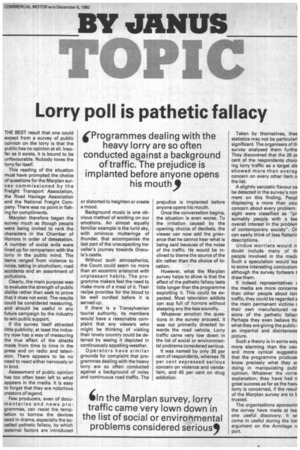Lorry poll is pathetic fallacy
Page 79

If you've noticed an error in this article please click here to report it so we can fix it.
Programmes dealing with the heavy lorry are so often conducted against a background of traffic. The prejudice is implanted before anyone opens his mouth,
THE BEST result that one could expect from a survey of public opinion on the lorry is that the public has no opinion at all. Insofar as it exists, it is bound to be unfavourable. Nobody loves the lorry for itself.
This reading of the situation must have prompted the choice of questions for the Marplan survey commissioned by the Freight Transport Association, the Road Haulage Association and the National Freight Company. There was no point in fishing for compliments.
Marplan therefore began the survey much as though people were being invited to rank the characters in the Chamber of Horrors in order of detestation. A number of social evils were lined up for comparison with the lorry in the public mind. The items ranged from violence to noise, taking in alcoholism, road accidents and an assortment of pollutions.
Clearly, the main purpose was to evaluate the strength of public dislike rather than seek to prove that it does not exist. The results could be considered reassuring, and should be useful in any future campaign by the industry to win public support.
If the survey itself attracted little publicity, at least the industry now has a way of measuring the true effect of the attacks made from time to time in the press and on radio and television. There appears to be no need to react either nervously or in kind.
Assessment of public opinion has too often been left to what appears in the media. It is easy to forget that they are notorious creators of legend.
Few producers, even of documentaries and news programmes, can resist the temptation to borrow the devices used in drama, especially the socalled pathetic fallacy, by which external factors are introduced or distorted to heighten or create a mood.
Background music is one obvious method of working on our emotions. An almost equally familiar example is the lurid sky, with ominous mutterings of thunder, that accompanies the last part of the unsuspecting traveller's journey towards Dracula's castle.
Without such atmospherics, the Count could seem no more than an eccentric aristocrat with unpleasant habits. The programme makers feel the need to make more of a meal of it. Their recipe provides for the blood to be well curdled before it is served up.
If there is a Transylvanian tourist authority, its members would have a reasonable complaint that any viewers who might be thinking of visiting their lovely country could be deterred by seeing it depicted in continuously appalling weather.
Operators have similar grounds for complaint that programmes dealing with the heavy lorry are so often conducted against a background of noisy and continuous road traffic. The prejudice is implanted before anyone opens his mouth.
Once the conversation begins, the situation is even worse. To the irritation caused by the opening chorus of decibels, the viewer can now add the grievance that he cannot hear what is being said because of the noise of the traffic. He would be inclined to blame the source of the din rather than the choice of location.
However, what the Marplan survey helps to show is that the effect of the pathetic fallacy lasts little longer than the programme exploiting it. This could be expected. Most television addicts can sup full of horrors without sleeping any the less soundly.
Whatever emotion the questions in the survey aroused, it was not primarily directed towards the road vehicle. Lorry traffic came very low down in the list of social or environmental problems considered serious.
It was named by only 26 per cent of respondents, whereas 76 per cent expressed serious concern on violence and vandalism, and 45 per cent on drug addiction. Taken by themselves, thes statistics may not be particularl significant. The organisers of th survey analysed them furthe They discovered that the 26 pf cent of the respondents choo: ing lorry traffic as a target als showed more than averag concern on every other item o the list.
A slightly sarcastic flavour ca be detected in the survey's corr ment on this finding. Peopl displaying a more than usw concern about every problem sight were classified as "pr sumably people with a keE overall interest in the problerr of contemporary society". Or can easily think of less flatterir descriptions.
Undue worriers would n doubt include many of th people involved in the medk Such a speculation would lea to some interesting conclusion! although the survey forbears t draw them.
If indeed representatives the media are more concerne than other people about lorr traffic, they could be regarded a the main permanent victims c their own manufactured ve sions of the pathetic fallac■ Perhaps they even believe thi what they are giving the public i an impartial and disintereste picture.
Such a theory is in some way more alarming than the usu, and more cynical suggestio that the programme producer know precisely what they ar doing in manipulating publ opinion. Whatever the correi explanation, they have had n great success as far as the heay lorry is concerned, if the resull of the Marplan survey are to L trusted.
The organisations sponsorin the survey have made at lea one useful discovery. It wi come in useful during the Ion argument on the Armitage rt port.












































































































































